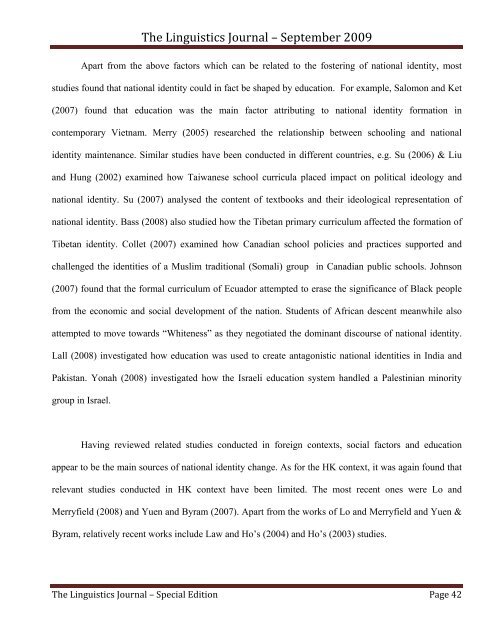The Linguistics Journal September 2009 Special Edition Language
The Linguistics Journal September 2009 Special Edition Language
The Linguistics Journal September 2009 Special Edition Language
You also want an ePaper? Increase the reach of your titles
YUMPU automatically turns print PDFs into web optimized ePapers that Google loves.
<strong>The</strong> <strong>Linguistics</strong> <strong>Journal</strong> – <strong>September</strong> <strong>2009</strong><br />
Apart from the above factors which can be related to the fostering of national identity, most<br />
studies found that national identity could in fact be shaped by education. For example, Salomon and Ket<br />
(2007) found that education was the main factor attributing to national identity formation in<br />
contemporary Vietnam. Merry (2005) researched the relationship between schooling and national<br />
identity maintenance. Similar studies have been conducted in different countries, e.g. Su (2006) & Liu<br />
and Hung (2002) examined how Taiwanese school curricula placed impact on political ideology and<br />
national identity. Su (2007) analysed the content of textbooks and their ideological representation of<br />
national identity. Bass (2008) also studied how the Tibetan primary curriculum affected the formation of<br />
Tibetan identity. Collet (2007) examined how Canadian school policies and practices supported and<br />
challenged the identities of a Muslim traditional (Somali) group in Canadian public schools. Johnson<br />
(2007) found that the formal curriculum of Ecuador attempted to erase the significance of Black people<br />
from the economic and social development of the nation. Students of African descent meanwhile also<br />
attempted to move towards “Whiteness” as they negotiated the dominant discourse of national identity.<br />
Lall (2008) investigated how education was used to create antagonistic national identities in India and<br />
Pakistan. Yonah (2008) investigated how the Israeli education system handled a Palestinian minority<br />
group in Israel.<br />
Having reviewed related studies conducted in foreign contexts, social factors and education<br />
appear to be the main sources of national identity change. As for the HK context, it was again found that<br />
relevant studies conducted in HK context have been limited. <strong>The</strong> most recent ones were Lo and<br />
Merryfield (2008) and Yuen and Byram (2007). Apart from the works of Lo and Merryfield and Yuen &<br />
Byram, relatively recent works include Law and Ho’s (2004) and Ho’s (2003) studies.<br />
<strong>The</strong> <strong>Linguistics</strong> <strong>Journal</strong> – <strong>Special</strong> <strong>Edition</strong> Page 42


